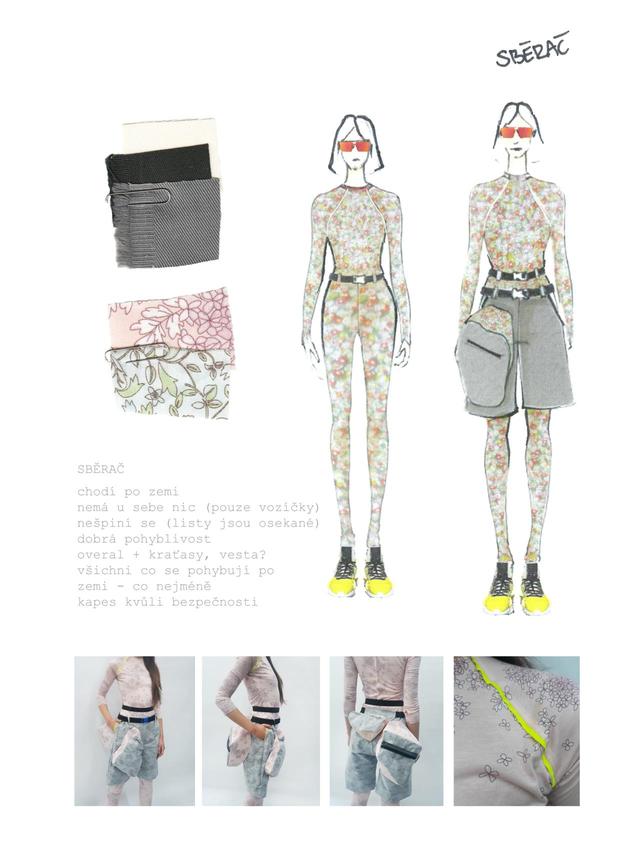Improve work clothes in agriculture. Designer Vendula Niklová continues the family tradition and solves the form of clothing that has not changed for years<
It hasn't even been a year since you defended your thesis. Where has your work moved since then?
VENDULA: I have to say that I'm putting my own creative works on the back burner now. I am currently working on several different projects, learning to communicate and work both with clients and contractors, to collaborate and co-create collections, to make compromises and to gather experience. I see that as the most important thing now. It will probably be that transitional period when you leave school and find out that everything works a little differently than you imagined during your studies. But it certainly does not mean that I will not return to my work. It is important for me that I enjoy creating and that I see meaning in it, whether I am creating my own work or collaborating with someone else.
One of the realized outfits adapted to the production of AGRO Haná | Source: diploma thesis of Vendula Niklová
Your diploma thesis deals with the topic of uniforms in agriculture, did you have a personal relationship with this field at the beginning, or did you discover the principles "on the fly"?
VENDULA: Topics like functionality and uniformity have always interested me. Work clothes and company uniforms have been sewn in our family workshop for several years. I thus had the opportunity to meet different types of functional materials that have specific added properties and are produced directly to order and for a specific activity - for safety or to simplify work.
I also dealt with the issue of automation, and that led me to think whether work clothes that have been used without changes for many years and work well, can be made differently. Whether it is necessary to modify work clothes due to modernization and changes in job content.

Model designs for individual occupations from the New Generation Uniform / Harvest | collection Source: diploma thesis of Vendula Niklová
You created the uniforms in cooperation with AGRO Haná, did you get to test the models in practice?
VENDULA: At AGRO Haná, they helped me create a foundation on which to build well. The work is mainly based on the needs for this type of operation, but some models would probably not survive in operation. Six of the most important functions from the entire process were implemented (e.g. tie-breaker, launcher, dispatch worker...). On these examples, it was easy to see how the way of work develops and what the original clothing can be cut from. For example, classic overalls are basically no longer allowed for safety reasons (in the environment of vertical farms, you can easily get caught or trip over plants and thus damage them...). The whole design line had about 13 outfits, but some of them no longer corresponded to specific functions. These were looser designs, but I worked with the same elements and techniques that I used throughout the process.
Free Model Designs | Source: diploma thesis of Vendula Niklová
Sustainability is a very topical topic these days. How do you define yourself in relation to this trend?
VENDULA: I think one of the main parameters of sustainability is the right choice of clothing to serve well and for as long as possible. It's about the attitude of the shopper - even if the product is made of plastic in the end, it can be sustainable, as long as I know it will serve me well for a long time. Unfortunately, I sometimes feel that sustainability has become just a trend that people hear about and its essence has started to disappear. Personally, I sew my things in the Czech Republic and I try to choose materials mostly made in the Czech Republic, if possible.
Vendula Niklová working on a model for Iris van Herpen Autumn / Winter Haute Couture collection 2018 | Source: archive of Vendula Niklová
How about an internship with Iris van Herpen? Many say that it is a big challenge and that this cooperation is very demanding. Did the internship influence your thinking about fashion or your approach to it?
VENDULA: It's challenging, but it's definitely doable. He works every day, about a month before Fashion Week, even on weekends and late into the night. I have to say that even though it was really tiring at times, the whole team was a great motivation for me. All those people there know what they want and why they are there, they give it their all and really work hard. Most of the Iris team are interns, and the whole team has about 10 people in total, so everyone has quite a lot of responsibility. The intern joins the studio in such a way that he will be at the creation of the entire collection, in the first few days they will touch you, find out what works best for you, and this is then your responsibility for almost the entire time that the collection is created. The interns are from a variety of fields, from fashion and textiles to graphic designers and designers. For example, I mainly worked with form – arranging, finding shape and cuts.
What really fascinated me was that if you only know these things from photos and videos, it doesn't occur to you that we could make a large part of those things at home on our knees without any special technologies. It's just about a demanding and long process, trying, developing, testing, communicating and learning to look at things from a slightly different angle than we're used to.


 Tags:
Tags: Prev
Prev







